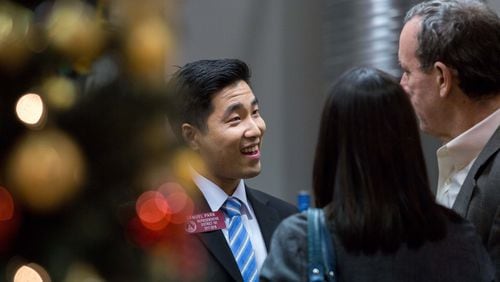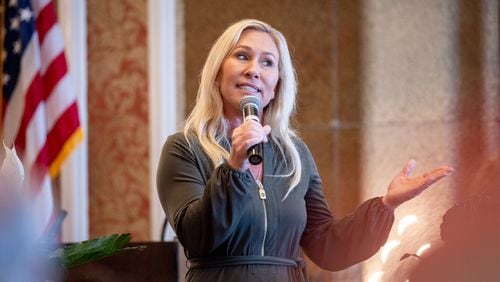Georgia’s General Assembly in January will seat four openly gay lawmakers — the most of any legislature in the South and among the largest contingents in legislative assemblies across the nation.
That status has given hope to gay rights advocates ahead of the upcoming legislative session to further humanize their fight for gay rights and give them ammunition to beat back anti-gay legislation. Gay lawmakers will still make up only a tiny minority in the state's Republican-led General Assembly — four of 236 members, and all Democrats at that — but both they and advocates say their presence is important in a conservative Southern state.
Many are expecting to battle some conservatives’ efforts to pass a “religious liberty” bill that opponents fear could free business owners to cite religious reasons to deny service to gay customers. Others expect legislation to try to protect faith-based organizations receiving state grants, such as private adoption agencies that only want to place children with opposite-sex adoptive parents.
“It’s not a time for fear,” said state Rep.-elect Sam Park, D-Lawrenceville, who surprised some last month by upsetting three-term Republican incumbent Valerie Clark in House District 101, which sits at the heart of suburban Gwinnett County. “I think it’s a time we really have to dig in our heels and be resilient and be vigilant with what occurs and what may happen.”
Park, the first openly gay man elected to serve in the state Capitol, follows a string of gay women in the General Assembly. Starting next year, he will join returning state Reps. Park Cannon, Karla Drenner and Keisha Waites in what amounts to a sort of unofficial gay caucus.
“Adding our voices to the mix is critical,” said Drenner, of Avondale Estates, who for many years was the only openly gay lawmaker in the Legislature after being elected in 2000.
Her early initiation into Capitol culture, she said, came in an unusual place: statehouse elevators. When the doors opened, “people would see me and say, ‘Oh, that’s OK, I’ll take the next one,’ ” said Drenner, who has made a habit of trying to extend herself — going to events and places where she wasn’t expected — as a way to break the ice and raise visibility.
A recent after-election count by the national Gay and Lesbian Victory Fund found 107 openly gay lawmakers in state legislatures or territories such as Guam. While some of the results seem obvious — California, at eight, had the most in the nation — Georgia’s neighbors topped out at two in Florida. Alabama and North Carolina each had one. Others, including Tennessee, had none.
That Georgia topped the list for Southern states may have something to do with Atlanta’s reputation for being fairly gay-friendly. A 2015 Gallup analysis estimated that 4.2 percent of metro Atlanta’s population identified as gay or lesbian, placing the region in the top half of a list of 50 metropolitan areas.
Drenner, however, said that kind of generalization misses a broader point that “in the districts in which we’ve been elected, the electorate is looking for the best candidate regardless of sexual orientation.”
For Park, that's part of why he ran. His platform included a vow to fight religious liberty legislation and anything he felt would harm the state's lesbian, gay, bisexual, transgender and queer community. He is mindful, however, that other issues are important to his constituents, too. That balancing act includes expanded transit options and greater access to health care and Medicaid, issues Park said resonated in his community — one of the most rapidly diversifying districts in the state.
Park’s district is majority-minority. Since the presidential election in 2012, the district has seen a decrease in white voters casting ballots of nearly 7 percentage points, with increases over that same time period of about 2.5 percentage points for both Latino and Asian voters. It’s also in the top 10 percent of all of Georgia’s 180 state House districts in the percentage of voters who are between 18 and 24 years old.
“People didn’t vote for me just because I’m openly gay,” said Park, who, as the son of Korean immigrants, will also be the only Asian-American representative in the General Assembly next year. “People didn’t vote for me just because I’m Asian. I couldn’t be more proud to represent the people in my community,” who, he said, expect him to focus on all the issues he ran on.
Still, bills that could affect the gay community both in Georgia and its neighbors have made huge headlines this year. This state's legislative session begins Jan. 9 on the heels of North Carolina's battle over a law barring communities from establishing protections for the LGBTQ community and banning transgender people from certain bathrooms, a requirement opponents denounced as discriminatory.
The fight over the North Carolina law has galvanized LGBTQ advocates, including those in Georgia.
Religious liberty proponents here, however, said it was not a defining moment for them. And they said it was wrong to read their push as anti-gay or as being disrespectful or discriminatory to the LGBTQ community.
"I couldn't disagree with that more strongly," state Sen. Josh McKoon, R-Columbus, said of being called anti-gay.
McKoon, who has been one of the chief sponsors of what’s formally known as a proposed Religious Freedom Restoration Act, said that unlike in North Carolina, the effort in Georgia is “not going to invalidate the city of Atlanta’s nondiscrimination act or prevent any other local or county government that decides to pursue such a measure.”
He and other supporters, which include one of the state’s leading religious organizations in the Georgia Baptist Mission Board, say the legislation would protect all religious viewpoints and prevent discrimination against faith-based groups, particularly those opposed to same-sex marriage.
To read anything more into it was wrong, McKoon said, adding, “I’ve tried to say this ad nauseum.”
No religious liberty bills have so far been filed ahead of next year's legislative session. Some legislative leaders, including House Speaker David Ralston, R-Blue Ridge, have gone so far as to say it is a federal issue and should be handled on that level.
Jeff Graham of Georgia Equality, an organization that advocates for the LGBTQ community, said having as many openly gay lawmakers as Georgia does can only humanize the debate. Earlier this year, Gov. Nathan Deal vetoed a religious liberty bill on grounds that it ran counter to the state's reputation of "warm, friendly and loving people."
That kind of thinking, Graham said, was part of an evolution he’s seen in the almost nine years since he started with his organization. Park’s election, he said, added another peg on that list, something Graham dubbed “glimmers of hope” amid an uncertain time.
“In politics, there are always winners and losers. We’re not naïve,” Graham said. “But it doesn’t have to be a zero sum game.”







